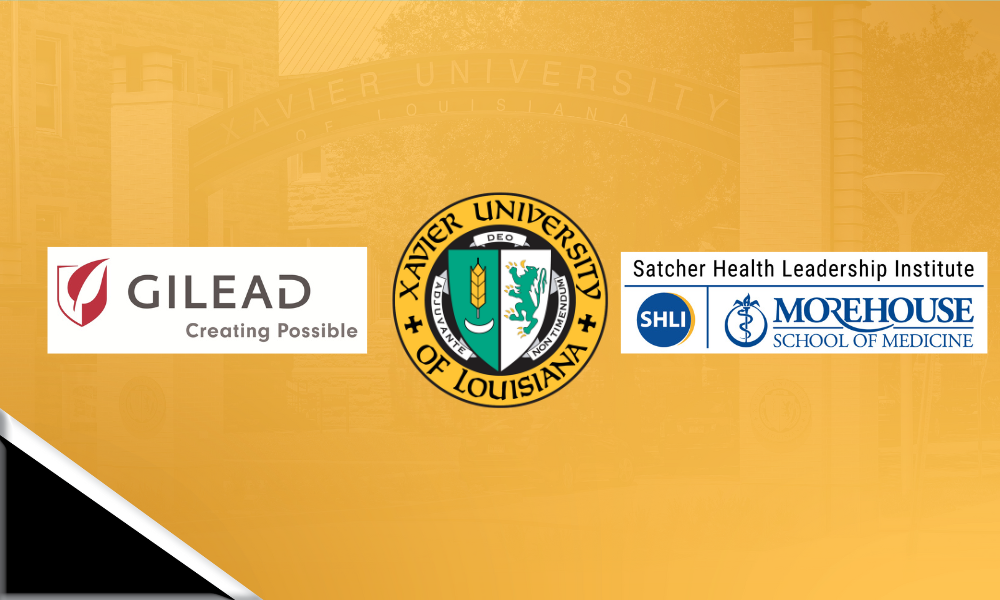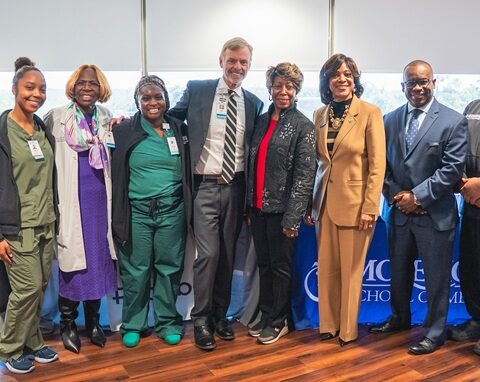Courtesy of Xavier University of Louisiana
Gilead Sciences, Inc. (Nasdaq: GILD) announced a new health equity collaboration with the Satcher Health Leadership Institute (SHLI) at Morehouse School of Medicine and the Center for Minority Health and Health Disparities Research and Education (CMHDRE) at Xavier University of Louisiana’s College of Pharmacy. The collaboration is focused on addressing the inequities in HIV care for Black communities in the Southern United States. Gilead has a broad and long-standing commitment to advancing global health equity, which it regards as critical to helping to end the HIV epidemic and improving health outcomes for all. The company’s health equity strategy focuses on collaborating with organizations that reach underrepresented and disproportionately impacted communities.
Research shows that inequities drive higher rates of HIV infection, as well as worse HIV clinical outcomes among Black Americans. The COVID-19 pandemic has further highlighted and exacerbated such health inequities, especially in the Southern United States. SHLI and CMHDRE are at the forefront of efforts to improve access to HIV care for Black communities in the Southern U.S. region. Gilead will award a total of $4.5 million in funding over a three-year period to support their work in three cities: Atlanta, Baton Rouge, La., and New Orleans.
The partnership between SHLI and CMHDRE, with support from Gilead, is intended to close critical gaps in care by:
- Increasing understanding of the impact of COVID-19 on the healthcare delivery system in the Black community
- Realigning HIV services to reflect the impact of the COVID-19 pandemic
- Providing training focused on culturally appropriate HIV care, inclusive of stigma-reducing strategies
- Increasing access to, and utilization of, culturally appropriate care for Black people impacted by the HIV epidemic
“Gilead knows that scientific innovation has the most impact on patients when we help remove societal barriers to care, such as discrimination and stigma. We are committed to investing in organizations, community leaders and experts working to address the underlying determinants of health outcomes,” said Rashad Burgess, Vice President of Advancing Health and Black Equity, Gilead Sciences. “This collaboration will focus on the barriers that are most prevalent in Black communities and help increase access to HIV care to produce better outcomes for Black people.”
“Though the COVID-19 pandemic was a setback to the American healthcare system overall, we must bring to the forefront disproportionately impacted communities who were already historically marginalized prior to the pandemic, including people living with HIV,” said Daniel E. Dawes, J.D., Executive Director, Satcher Health Leadership Institute at Morehouse School of Medicine, and author of The Political Determinants of Health. “The Satcher Health Leadership Institute will collaborate with Gilead and Xavier University of Louisiana to ensure these communities are not an afterthought.”
“Xavier’s Center for Minority Health and Health Disparities Research and Education in the College of Pharmacy is proud to partner with Gilead and the Satcher Health Leadership Institute at Morehouse School of Medicine for such an important initiative,” said Dr. Kathleen Kennedy, Dean of Xavier University of Louisiana’s College of Pharmacy. “Xavier is a top producer of African Americans with a Doctor of Pharmacy degree, and we instill in our graduates the mission of Xavier and the desire to serve the underserved with an effort to mitigate health disparities for underrepresented communities.”
This latest collaboration is part of Gilead’s broader health equity strategy to support community organizations across the globe in addressing social determinants of health. A recent report commissioned by Gilead, “HIV In The Time of COVID-19: Leaving No-One Behind to Truly End the HIV Epidemic,” details a broad range of barriers to health equity including social and economic factors. While predictors of health outcomes such as race, ethnicity and gender have long existed, the COVID-19 pandemic has exacerbated health inequities, especially for marginalized communities and those affected by HIV. Gilead is increasing investment to address these underlying inequities highlighted by the intersection of the two health crises.
Other Gilead programs that address health equity include the COMPASS Initiative®, a ten-year, $100 million commitment toward addressing HIV/AIDS inequities in the U.S. South, which continues to challenge the structural barriers that are most prevalent in Black communities. Gilead’s Zeroing In™ program supports communities in 41 countries that have been hit doubly hard by HIV and the COVID-19 pandemic. Gilead also created a $10 million Racial Equity Community Impact Fund to support organizations fighting the racial inequities that affect Black communities. In its most recent report, the Funders Concerned About AIDS named Gilead the number one overall philanthropic funder of HIV/AIDS programs.
About Gilead Sciences
Gilead Sciences, Inc. is a biopharmaceutical company that has pursued and achieved breakthroughs in medicine for more than three decades, with the goal of creating a healthier world for all people. The company is committed to advancing innovative medicines to prevent and treat life-threatening diseases, including HIV, viral hepatitis, cancer and inflammation. Gilead operates in more than 35 countries worldwide, with headquarters in Foster City, California.
Gilead has promoted equity, particularly healthcare equity, since the company brought its first therapies to the market. Through global partnerships, Gilead’s medicines today reach millions of people in low- and middle-income countries around the world. In the United States, Gilead has committed more than $100 million over 10 years through the COMPASS Initiative® to community organizations that are working to combat HIV in the U.S. South. In 2020, Gilead launched the Racial Equity Community Impact Fund to support organizations tackling racial inequities affecting Black communities across the United States.





